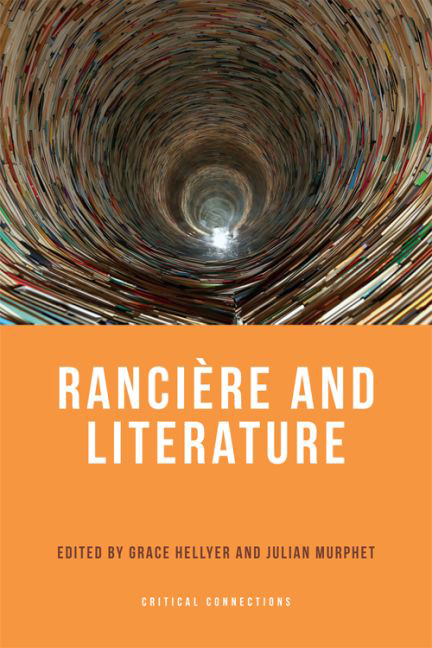Book contents
- Frontmatter
- Contents
- Acknowledgements
- Notes on Contributors
- Introduction: Rancière and Literature
- SECTION I Coordinates
- 1 Fictions of Time
- 2 Jacques Rancière in the Forest of Signs: Indiscipline, Figurality and Translation
- 3 Rancière and Tragedy
- 4 Rancière Lost: On John Milton and Aesthetics
- 5 ‘A New Mode of the Existence of Truth’: Rancière and the Beginnings of Modernity 1780–1830
- SECTION II Realisms
- SECTION III Contemporaneities
- Index
4 - Rancière Lost: On John Milton and Aesthetics
from SECTION I - Coordinates
Published online by Cambridge University Press: 15 September 2017
- Frontmatter
- Contents
- Acknowledgements
- Notes on Contributors
- Introduction: Rancière and Literature
- SECTION I Coordinates
- 1 Fictions of Time
- 2 Jacques Rancière in the Forest of Signs: Indiscipline, Figurality and Translation
- 3 Rancière and Tragedy
- 4 Rancière Lost: On John Milton and Aesthetics
- 5 ‘A New Mode of the Existence of Truth’: Rancière and the Beginnings of Modernity 1780–1830
- SECTION II Realisms
- SECTION III Contemporaneities
- Index
Summary
The ideas of eternity and infinity are among the most affecting we have; and yet perhaps there is nothing of which we really understand so little, as of infinity and eternity.
Edmund BurkeThe Argument
England falsifies France; or, English falsifies French. The English Revolution of the mid seventeenth century accomplished, well over a century before the American and French Revolutions, the legal execution of a monarch and the installation of a new form of republic. John Milton, radical puritan, polemicist and poet, was instrumental in that (qualified) English success. Proselytiser for divorce, new kinds of education, the extrication of religion from the state, and epic poet, Milton produced work which at once exemplifies many of the theses proffered by Jacques Rancière regarding politics, education and aesthetics – as he exceeds and falsifies them. This chapter will discuss a late pamphlet of John Milton titled Of True Religion, in order to suggest how Milton confronts and rebukes Rancière's theories of disagreement, ignorant masters and the distributions of the sensible, not only by contravening many of the latter's demonstrations and arguments, but in anticipating them. The key points of the exposition will hinge on Milton's doctrines of indiscernibility, infinity and decision. In doing so, this chapter shows how Rancière's three regimes seem unable to account for a fourth modality, transversal to his own.
Distributions of the sensible
Rancière opens his brilliant book Aisthesis (2011) with a reiteration of his by-now well-known position. ‘For two centuries in the West’, Rancière asserts, ‘“aesthetics” has been the name for the category designating the sensible fabric and intelligible form of what we call “Art” […] Art as a notion designating a form of specific experience has only existed in the West since the end of the eighteenth century.’
- Type
- Chapter
- Information
- Rancière and Literature , pp. 76 - 98Publisher: Edinburgh University PressPrint publication year: 2016



